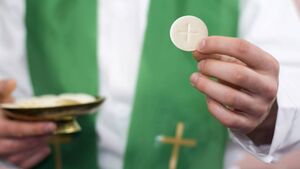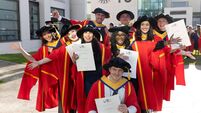Question of Faith: First Holy Communion

The children really look forward to their First Holy Communion day. Stock image
The first few weeks after the summer holidays is a busy time in our parishes as we meet with parents of children in second class and sixth class in our schools.
The dates for First Communion and Confirmation are agreed and we meet with parents to discuss the parish-based preparation programmes for the sacraments.
The children really look forward to their First Holy Communion day.
I suppose it's only natural that the promise of a huge party, with bouncy castles and generous financial donations from relatives and family friends.
This secular dimension of the celebration is important in itself as it emphasises the love and esteem of parents and siblings and wider family for the child.
It marks a transitional period in the life of the child as they grow in awareness of their responsibility to others, becoming more independent and more curious about the world around them.
The spiritual dimension of First Holy Communion is not opposed or distinct from the secular side.
There is no dichotomy between the sacred and the secular, really.
I am always amazed at children’s instinctive grasp of this.
They have an amazing capacity for wonder and awe, and the idea of a loving God who reaches out to them in love and friendship in Jesus is as natural to them as the air they breathe. I am puzzled by the claim that this is indoctrination when a humanist approach that denies the supernatural is not. (But this is a bigger question to be explored at another time).
The sacrament of First Eucharist through symbol and ritual communicates the awesome reality of Jesus as the Bread of Life.
Dimensions of the Eucharistic liturgy serve to elucidate the unique perspective on life which flows from Jesus of Nazareth. Jesus welcomed everyone to share a table with him. The outcast, marginalised, the sinner, were invited to share a table with the elite.
When we gather for Eucharist on Sunday, there is no division in the church; the richest and the poorest sit together - there is no such thing as class distinction. St Paul puts it well.. “there is no distinction between Jew and Greek, slave or free, male or female; all are one in Christ Jesus.”
The Eucharist then is about hospitality. There is a place for everyone at God’s table.
A central dimension of Eucharist is, of course, the breaking of the Bread, the Bread of Life. Bread is broken to be shared.
It is Jesus sharing life with us and calling us into communion with one another.
To be in communion means there should be no division, conflict can be reconciled and that everyone is respected as a child of the Father.
Sharing Eucharist thus anethemises racism, misogyny, and any other form of segregation; the Traveller, the immigrant, the asylum seeker, the down and out, all are called to communion in the Lord.
The breaking of the Eucharistic bread to be shared in Communion is a powerful affirmation of the unique dignity and absolute equality of all people in the eyes of God.
Christians celebrate Eucharist because Jesus commanded us to “do this in memory of me".
It is a memorial of the last supper Jesus shared with the disciples.
But also a memorial of his suffering and death on the cross.
I’m so conscious that everyone at our Eucharistic gathering comes with some crosses in their lives.
There is suffering and pain in all our lives.
The Eucharist is a transforming encounter with the One who endured violence to uphold the truth, who embraced the darkness of despair and failure, but who trusted totally in the possibility of a power of love to overcome darkness and to bring healing.
That trust was answered in the Resurrection, the raising of Jesus to new life.
The Eucharistic encounter with the Lord can be such a source of healing for people as they connect their own brokenness with the broken body of Jesus on the cross, but believing that the cross and suffering do not have the last word.
Catholic Christians believe in the Real Presence of Jesus in the Eucharist.
We all experience how enriching it is when someone is truly present to us.
It is life-affirming, we feel we are being listened to and cared for.
It is a great gift to someone and it is a profoundly spiritual experience.
As I said, I’m always amazed at the how much the children can instinctively almost connect with much of Eucharistic doctrine, at their own level of course.
Because they are so loved by Jesus, they realise that they must be kind to one another, to respect people and never to bully other children.
They learn about forgiveness and reconciliation.
The faith journey to First Eucharist helps the kids appreciate how important it is to be grateful – to express thanks to God, to parents, to teachers etc. (Eucharist literally means giving thanks).






